新概念第二册-Lesson 41 Do you call that a hat课件(共27张PPT)
文档属性
| 名称 | 新概念第二册-Lesson 41 Do you call that a hat课件(共27张PPT) | 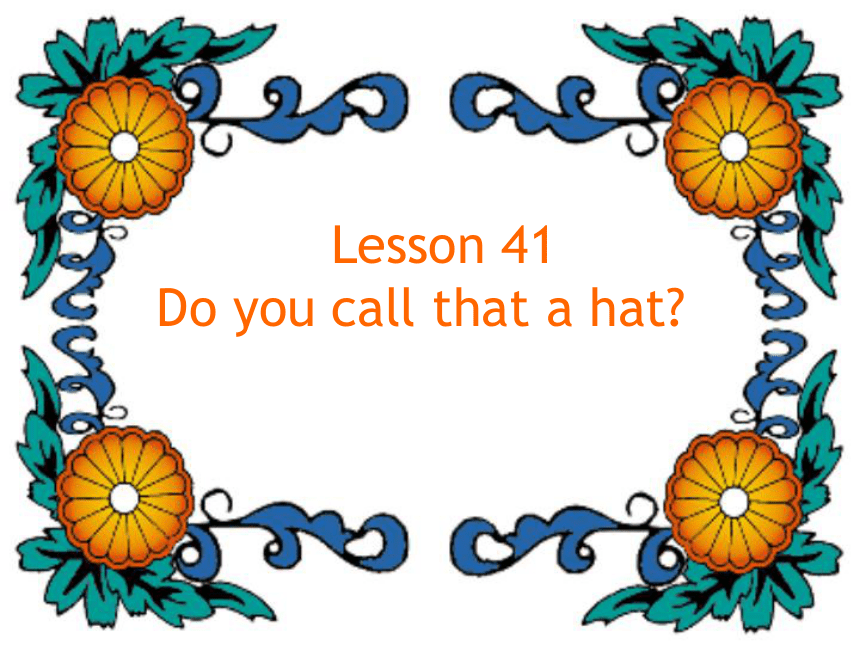 | |
| 格式 | pptx | ||
| 文件大小 | 3.0MB | ||
| 资源类型 | 教案 | ||
| 版本资源 | 新概念英语 | ||
| 科目 | 英语 | ||
| 更新时间 | 2025-01-02 14:05:29 | ||
图片预览


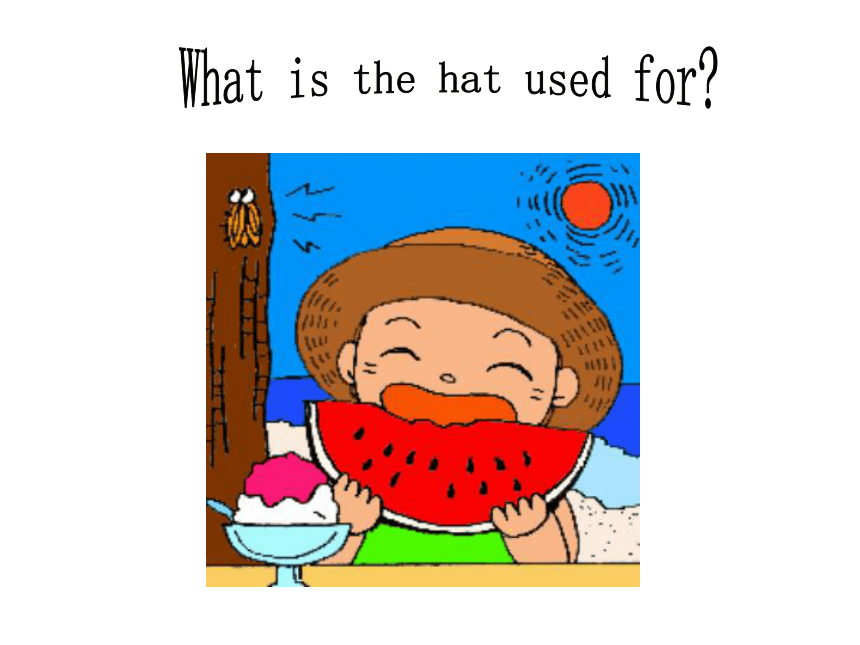
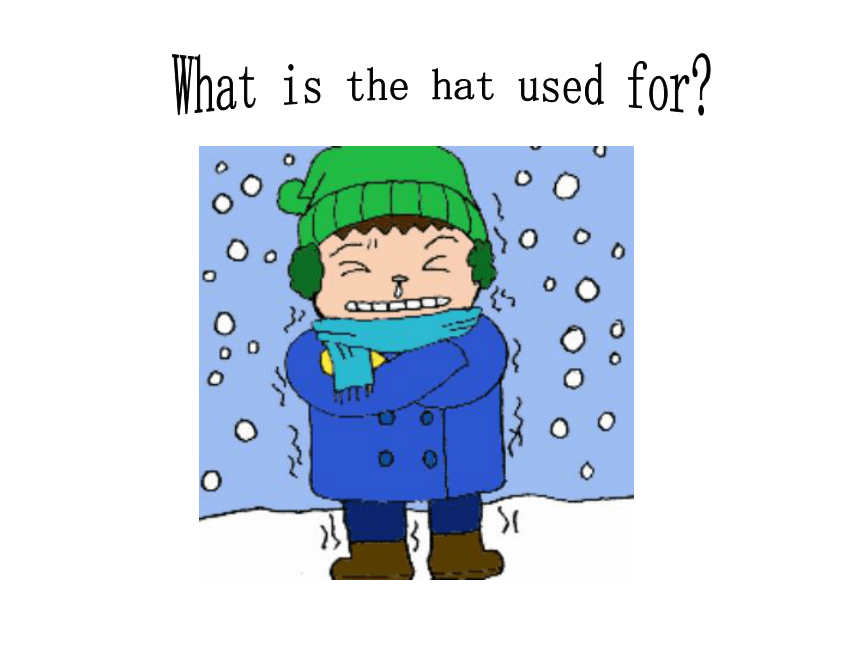


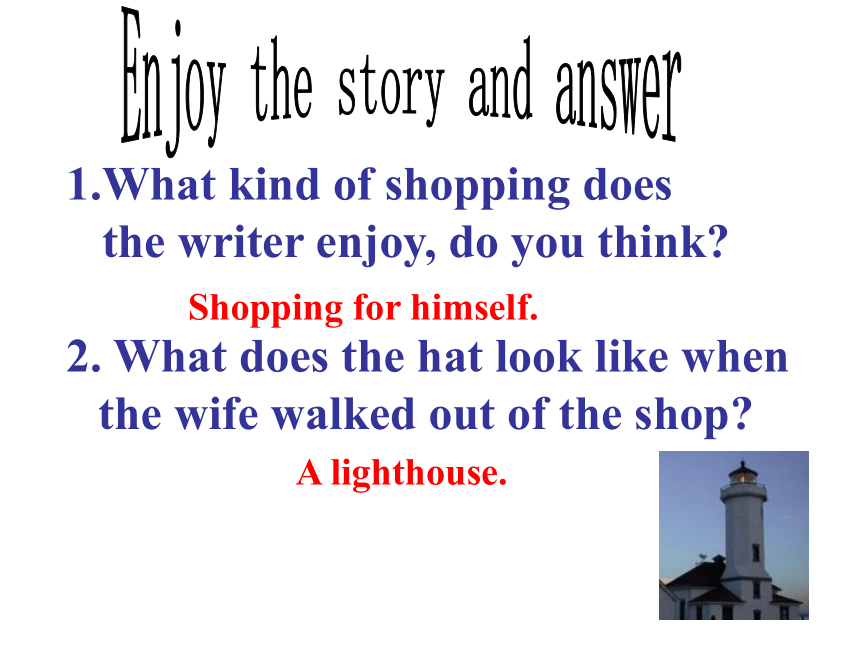

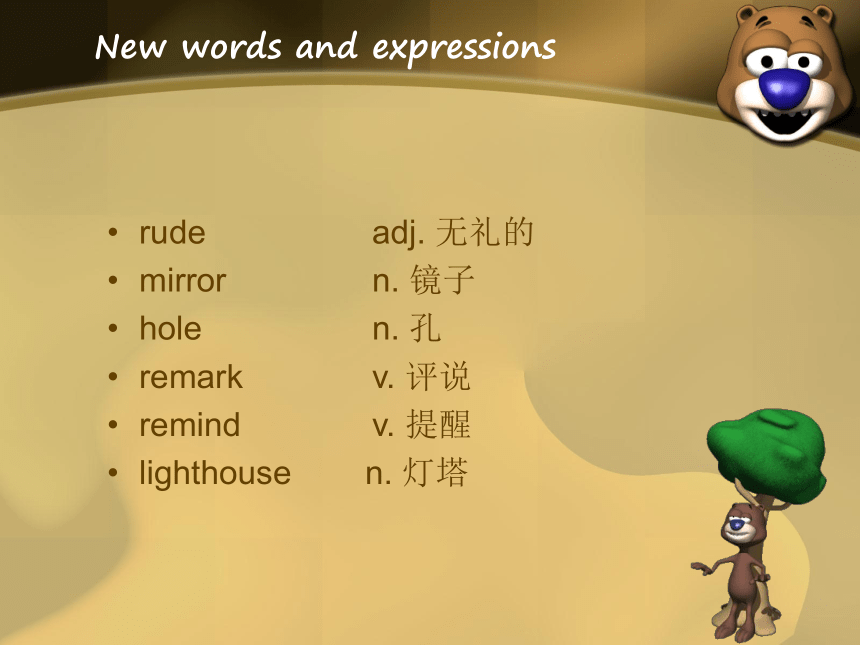
文档简介
(共27张PPT)
Lesson 41
Do you call that a hat
Do you like wearing a hat
When do you usually put on a hat
What is the hat used for
What is the hat used for
What is the hat used for
That man is Mike, wearing his new tie, and a gold tie pin, as shiny as his grin.
It is said that a woman can’t have too many hats.
What about the man
Enjoy the story and answer
What kind of shopping does
the writer enjoy, do you think
2. What does the hat look like when the wife walked out of the shop
Shopping for himself.
A lighthouse.
discuss
Do you often buy something that you don’t really need
What is it
2. Who do you think are generally more extravagant, men or women Why
3. What is meant by the proverb: Waste not, want not”
New words and expressions
rude adj. 无礼的
mirror n. 镜子
hole n. 孔
remark v. 评说
remind v. 提醒
lighthouse n. 灯塔
New words and expressions
rude adj. 无礼的(强调故意的)
impolite adj. 不礼貌,表示没有注意到礼节性的问题, 所以显得有些不礼貌(polite的反义词,以p开头的形容词的否定前缀为im)
cheeky adj. 无礼, 没礼貌的(表示小孩对长辈)
Don’t be cheeky! 不得无礼!
naive adj. 天真的
be rude about sth. 对事很粗鲁
be rude to sb. 对人很粗鲁
Don't be rude to me. 别对我这么粗鲁
New words and expressions
mirror n. 镜子
look at oneself in the mirror 照镜子
look up sth. in the dictionary 查字典
Mirror of… ……的写照,……的真实反映
His novel is a mirror of his time. 他的小说就是他那个时代的真实写照
New words and expressions
remark
v. 评说
remark主要指说, 当say 来理解
I remarked that I would go shopping that afternoon.
我说过那天下午我要去买东西。
n. 议论、评论
She has made outspoken remarks about the rights of women.
她直言不讳地评论过妇女主权问题。
New words and expressions
remind v. 提醒
① vt. 提醒
remind sb. to do sth. / remind sb. that…
提醒某人做某事
He reminded his wife that they needed to buy some coffee and sugar.
② vt. 使……想起
remind sb. of sth.
The smell of cabbage reminds me of school. 卷心菜的气味使我想起了学校。
She reminds me of her sister.
reminder n.
Explanation
1、Do you call that a hat
A:叫做、称作
“Do you call that +(冠词)+名词”这个结构可以表达一种轻蔑的含义:
Do you call that a house/a dog
你把那个叫房子/狗吗?
Call sb./sth…..
Just call me Sarah.
B:把…描述为; 把…说成
She calls me lazy and selfish. 她说我又懒又自私。
Explanation
2、I sat down on one of those modern chairs with holes in it and waited.
on the chair 在椅子上
with holes in it 作定语
Jane put a piece of paper with her name and address on it into a bottle.
3、We had been in the hat shop for half an hour and my wife was still in front of the mirror.
名词修饰名词, 一般用单数:bookstore书店,drugstore药店
Explanation
4、'You needn't have said that,' my wife answered. 'I needn't remind you of that terrible tie you bought yesterday.'
needn't have done
原本不必做, 但是做了, 强调过去的动作不必做
You needn't have bought it. 你原本不必买的
You needn’t have come. 你原本不必来的。
needn't do
现在不必做,强调现在的动作也不必做
You needn’t come. 你不必来。
Need
1、及物动词需要 I need you.
2、 情态动词必要,和否定连用
need not
Must
1、主观表必须 I must help you.
2、客观表必要
Candidates must satisfy the general conditions for admission.
应试者必须满足录取的一般条件。
Must do ——现在
Must have done——过去
Must not
get on
stand in line
turn
get off
push
What must/ must not you do when…
What must/ must not you do when…
passenger
make a noise
disturb
JIM: You must be more careful. That car nearly hit you.
KATE: I want to catch that bus.
JIM: Well, you mustn't cross the road now. It's dangerous. A car may hit you.
When you cross the road, you must look carefully.
What must you do when you are ill
stay in bed
take some medicine
wear warm clothes
see the doctor
What do you have to do when you are ill
You mustn’t eat anything
until you see the doctor.
When you are at school, what should you do ,and what you shouldn’t do Please choose.
We copy others’ homework.
We look after our desks.
We wear school clothes.
We bring pets to school
We get to school on time.
We throw food about.
Boys wear long hair.
We finish our homework ourselves.
We listen to the teacher carefully..
We make a big noise after class.
must
mustn’t
Explanation
5、'I find it beautiful,' I said.
动词find经常用于“动词+宾语+宾语补足语”这种结构:
You’ll find it difficult/easy to make conversation with her.
6、A man can never have too many ties.
can never…too…=cannot…too…
无论……也不为过
A man can never have too many ties.
I can never thank you too much.
A wife can never complain too much.
You can’t be too careful in doing your work.
Special Difficulties
Remark, Observe and Notice
remark与observe都可以表示“说,评论说”,它们比say要正式:
‘You’re looking very well!’She remarked/observed.
notice和observe都可以表示“注意到,察觉到”,但有一定区别。notice指无意中“察觉到”;observe则可以指有意观察、仔细地看,比notice更正式:
1. He__________ me carefully. (He looked at me.) 他仔细地看着我.
2. Did you ________ how she was dressed 你注意到她的穿戴了吗
3. I’ve _____________that he telephones her oftener than before.
我发现/注意到他现在给她打电话比以前次数多了。
4. I didn’t _________his leaving.
make rude remark / call one's name / say F words (F 指 fuck) 讲粗话,骂人
He made a lot of rude remarks about the hat she was wearing.
fail to do sth. 没有能够
not fail to 表示强烈地肯定
I had changed the furniture round that you can not fail to notice it.
我已经把周围的家具都换了。
Key structure
call sb. sth.
look at oneself in the mirror
one of + 复数名词
with, without, have, there be
remark, observe, notice P. 188
regret / regretted/ regret doing sth.
at once / right away / immediately
remind sb. of sth. = make … remember
can’t … too many / too much/ much too
look like / be like/ unlike / dislike
mustn’t / needn’t 情态动词
See you!
Lesson 41
Do you call that a hat
Do you like wearing a hat
When do you usually put on a hat
What is the hat used for
What is the hat used for
What is the hat used for
That man is Mike, wearing his new tie, and a gold tie pin, as shiny as his grin.
It is said that a woman can’t have too many hats.
What about the man
Enjoy the story and answer
What kind of shopping does
the writer enjoy, do you think
2. What does the hat look like when the wife walked out of the shop
Shopping for himself.
A lighthouse.
discuss
Do you often buy something that you don’t really need
What is it
2. Who do you think are generally more extravagant, men or women Why
3. What is meant by the proverb: Waste not, want not”
New words and expressions
rude adj. 无礼的
mirror n. 镜子
hole n. 孔
remark v. 评说
remind v. 提醒
lighthouse n. 灯塔
New words and expressions
rude adj. 无礼的(强调故意的)
impolite adj. 不礼貌,表示没有注意到礼节性的问题, 所以显得有些不礼貌(polite的反义词,以p开头的形容词的否定前缀为im)
cheeky adj. 无礼, 没礼貌的(表示小孩对长辈)
Don’t be cheeky! 不得无礼!
naive adj. 天真的
be rude about sth. 对事很粗鲁
be rude to sb. 对人很粗鲁
Don't be rude to me. 别对我这么粗鲁
New words and expressions
mirror n. 镜子
look at oneself in the mirror 照镜子
look up sth. in the dictionary 查字典
Mirror of… ……的写照,……的真实反映
His novel is a mirror of his time. 他的小说就是他那个时代的真实写照
New words and expressions
remark
v. 评说
remark主要指说, 当say 来理解
I remarked that I would go shopping that afternoon.
我说过那天下午我要去买东西。
n. 议论、评论
She has made outspoken remarks about the rights of women.
她直言不讳地评论过妇女主权问题。
New words and expressions
remind v. 提醒
① vt. 提醒
remind sb. to do sth. / remind sb. that…
提醒某人做某事
He reminded his wife that they needed to buy some coffee and sugar.
② vt. 使……想起
remind sb. of sth.
The smell of cabbage reminds me of school. 卷心菜的气味使我想起了学校。
She reminds me of her sister.
reminder n.
Explanation
1、Do you call that a hat
A:叫做、称作
“Do you call that +(冠词)+名词”这个结构可以表达一种轻蔑的含义:
Do you call that a house/a dog
你把那个叫房子/狗吗?
Call sb./sth…..
Just call me Sarah.
B:把…描述为; 把…说成
She calls me lazy and selfish. 她说我又懒又自私。
Explanation
2、I sat down on one of those modern chairs with holes in it and waited.
on the chair 在椅子上
with holes in it 作定语
Jane put a piece of paper with her name and address on it into a bottle.
3、We had been in the hat shop for half an hour and my wife was still in front of the mirror.
名词修饰名词, 一般用单数:bookstore书店,drugstore药店
Explanation
4、'You needn't have said that,' my wife answered. 'I needn't remind you of that terrible tie you bought yesterday.'
needn't have done
原本不必做, 但是做了, 强调过去的动作不必做
You needn't have bought it. 你原本不必买的
You needn’t have come. 你原本不必来的。
needn't do
现在不必做,强调现在的动作也不必做
You needn’t come. 你不必来。
Need
1、及物动词需要 I need you.
2、 情态动词必要,和否定连用
need not
Must
1、主观表必须 I must help you.
2、客观表必要
Candidates must satisfy the general conditions for admission.
应试者必须满足录取的一般条件。
Must do ——现在
Must have done——过去
Must not
get on
stand in line
turn
get off
push
What must/ must not you do when…
What must/ must not you do when…
passenger
make a noise
disturb
JIM: You must be more careful. That car nearly hit you.
KATE: I want to catch that bus.
JIM: Well, you mustn't cross the road now. It's dangerous. A car may hit you.
When you cross the road, you must look carefully.
What must you do when you are ill
stay in bed
take some medicine
wear warm clothes
see the doctor
What do you have to do when you are ill
You mustn’t eat anything
until you see the doctor.
When you are at school, what should you do ,and what you shouldn’t do Please choose.
We copy others’ homework.
We look after our desks.
We wear school clothes.
We bring pets to school
We get to school on time.
We throw food about.
Boys wear long hair.
We finish our homework ourselves.
We listen to the teacher carefully..
We make a big noise after class.
must
mustn’t
Explanation
5、'I find it beautiful,' I said.
动词find经常用于“动词+宾语+宾语补足语”这种结构:
You’ll find it difficult/easy to make conversation with her.
6、A man can never have too many ties.
can never…too…=cannot…too…
无论……也不为过
A man can never have too many ties.
I can never thank you too much.
A wife can never complain too much.
You can’t be too careful in doing your work.
Special Difficulties
Remark, Observe and Notice
remark与observe都可以表示“说,评论说”,它们比say要正式:
‘You’re looking very well!’She remarked/observed.
notice和observe都可以表示“注意到,察觉到”,但有一定区别。notice指无意中“察觉到”;observe则可以指有意观察、仔细地看,比notice更正式:
1. He__________ me carefully. (He looked at me.) 他仔细地看着我.
2. Did you ________ how she was dressed 你注意到她的穿戴了吗
3. I’ve _____________that he telephones her oftener than before.
我发现/注意到他现在给她打电话比以前次数多了。
4. I didn’t _________his leaving.
make rude remark / call one's name / say F words (F 指 fuck) 讲粗话,骂人
He made a lot of rude remarks about the hat she was wearing.
fail to do sth. 没有能够
not fail to 表示强烈地肯定
I had changed the furniture round that you can not fail to notice it.
我已经把周围的家具都换了。
Key structure
call sb. sth.
look at oneself in the mirror
one of + 复数名词
with, without, have, there be
remark, observe, notice P. 188
regret / regretted/ regret doing sth.
at once / right away / immediately
remind sb. of sth. = make … remember
can’t … too many / too much/ much too
look like / be like/ unlike / dislike
mustn’t / needn’t 情态动词
See you!
同课章节目录
